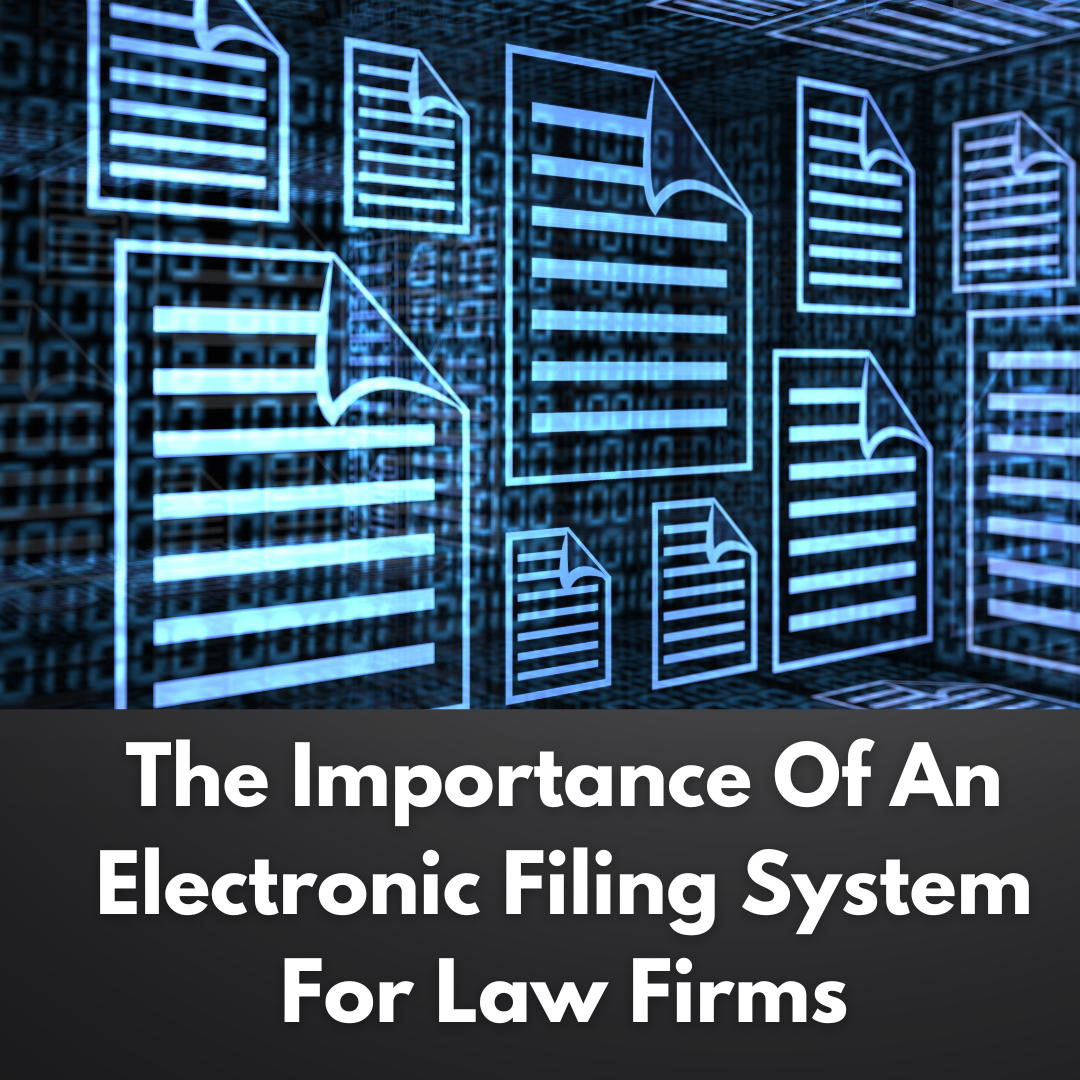The importance of an electronic filing system for legal document management cannot be overstated. In today’s digital age, where legal professionals deal with a significant volume of documents daily, an efficient electronic filing system is crucial. These systems streamline the document management process and provide numerous advantages to legal firms and professionals, including:
- Organization and Accessibility: Electronic filing systems allow legal professionals to organize and categorize their documents in a centralized location. This makes it easier to search for, access, and retrieve files when needed. Such systems usually feature advanced search functionalities, which save time and effort.
- Security and Confidentiality: An electronic filing system provides robust security measures to protect sensitive information from unauthorized access, loss, or damage. It can include encryption, user authentication, and access controls to safeguard the data, thus upholding client confidentiality.
- Collaboration and Communication: These systems facilitate seamless collaboration among team members by providing real-time access to documents and updates. Colleagues can work on documents simultaneously, review changes, and communicate effectively. This boosts productivity and ensures better client service.
- Time and Cost Efficiency: Electronic filing systems automate various document management tasks, such as scanning, indexing, and storage, which saves time and resources. Furthermore, digital storage reduces the need for physical space and storage costs.
- Version Control and Audit Trail: Legal professionals often have to work on multiple versions of a document. An electronic filing system allows for easy tracking of changes and versions, reducing the risk of using outdated information. It also provides an audit trail, ensuring accountability and transparency.
- Compliance and Risk Management: Electronic filing systems help maintain compliance with regulatory requirements by managing retention schedules and providing alerts for important deadlines. They also aid in risk management by preventing loss or unauthorized access to critical information.
- Eco-friendly: Going paperless with an electronic filing system is not only cost-effective but also environmentally friendly. It significantly reduces paper usage and the need for physical storage, thereby minimizing the firm’s environmental footprint.
- Disaster Recovery: In the event of a disaster, such as a fire, flood, or system crash, electronic filing systems enable quick recovery of important documents. This is possible through data backups and cloud-based storage, ensuring business continuity and client confidence.
In summary, an electronic filing system is vital for efficient legal document management. It enhances organization, security, collaboration, and compliance while saving time, costs, and promoting sustainability.

As a result, legal professionals can focus more on providing high-quality services to their clients.
Are Electronic Filing Systems Safe For Law Firms To Use?
Electronic filing systems can be safe for law firms to use, provided they have appropriate security measures in place. In fact, these systems often have robust security features designed to protect sensitive information from unauthorized access, loss, or damage. However, it is crucial for law firms to carefully evaluate and select a suitable electronic filing system to ensure that it meets their specific security requirements. Here are some key aspects to consider when assessing the safety of an electronic filing system:
- Data Encryption: The system should employ strong encryption protocols to protect stored data and data in transit. This ensures that even if an unauthorized party intercepts the data, it remains unreadable.
- User Authentication and Access Control: The system should have multi-factor authentication and strict access control measures in place, allowing only authorized personnel to access sensitive documents. This helps prevent unauthorized access and data breaches.
- Regular Software Updates: The electronic filing system provider should perform regular software updates and security patches to protect against new threats and vulnerabilities. The law firm should also ensure that their own software and hardware are kept up-to-date.
- Data Backup and Recovery: The system should offer data backup and recovery features to ensure that important documents can be quickly retrieved in case of data loss or disasters. This can include local backups as well as offsite or cloud-based storage solutions.
- Compliance with Industry Standards and Regulations: The system should comply with relevant industry standards and regulations, such as the GDPR (General Data Protection Regulation) or the Health Insurance Portability and Accountability Act (HIPAA) in the United States, depending on the nature of the data being stored.
- Secure Data Centers: If the electronic filing system relies on cloud-based storage, it is essential to ensure that the data centers used by the provider are secure and follow industry best practices.
- Regular Security Audits: Conducting regular security audits and penetration tests can help identify potential vulnerabilities and ensure that the system is safe from unauthorized access.
- Employee Training: To maintain the security of an electronic filing system, law firms should provide adequate training to their staff on best practices, including using strong passwords, recognizing phishing attempts, and promptly reporting any suspicious activity.
While electronic filing systems can be safe for law firms to use, it is crucial to remain vigilant and continuously monitor the system’s security measures. By implementing a strong security policy and educating employees about potential risks, law firms can greatly reduce the likelihood of data breaches and other security-related incidents.
Why Is Legal Document Management Software Important For Law Firms?
Legal document management software is important for law firms to have because it offers several benefits that streamline daily operations and enhance overall efficiency. Some of the key reasons why such software is essential for law firms include:
- Improved Organization and Accessibility: Legal document management software allows law firms to store, categorize, and organize documents in a centralized repository. This facilitates quick and easy retrieval of files when required, boosting productivity and reducing time wasted searching for information.
- Enhanced Security and Confidentiality: These software systems typically come with built-in security features such as encryption, user authentication, and access controls to ensure the protection of sensitive data. This helps maintain client confidentiality and prevent data breaches.
- Streamlined Collaboration and Communication: Legal document management software facilitates better collaboration among team members by allowing multiple users to access, review, and edit documents simultaneously. This enhances teamwork and ensures effective communication among team members, ultimately improving client service.
- Time and Cost Efficiency: The automation of routine tasks, such as document scanning, indexing, and storage, saves time and resources. Additionally, a reduction in physical storage space and paper usage translates to cost savings for the firm.
- Version Control and Audit Trail: Law firms often work with multiple versions of a document. Document management software allows for easy tracking of changes and versions, reducing the risk of using outdated information. An audit trail feature also helps maintain transparency and accountability.
- Compliance and Risk Management: Legal document management software helps ensure compliance with regulatory requirements by managing document retention schedules and providing alerts for important deadlines. This aids in risk management by preventing the loss or unauthorized access of critical information.
- Disaster Recovery: In the event of a disaster, such as a fire or flood, legal document management software allows for quick recovery of important documents through data backups and cloud-based storage solutions, ensuring business continuity and client confidence.
- Competitive Advantage: Implementing a robust legal document management software can provide a competitive edge, as it enables law firms to operate more efficiently and provide higher quality services to their clients.
In summary, legal document management software is important for law firms as it optimizes document organization, enhances security, streamlines collaboration, and saves time and costs. By leveraging these benefits, law firms can focus on their core competencies and provide better services to their clients, ultimately driving success and growth.






Leave A Comment